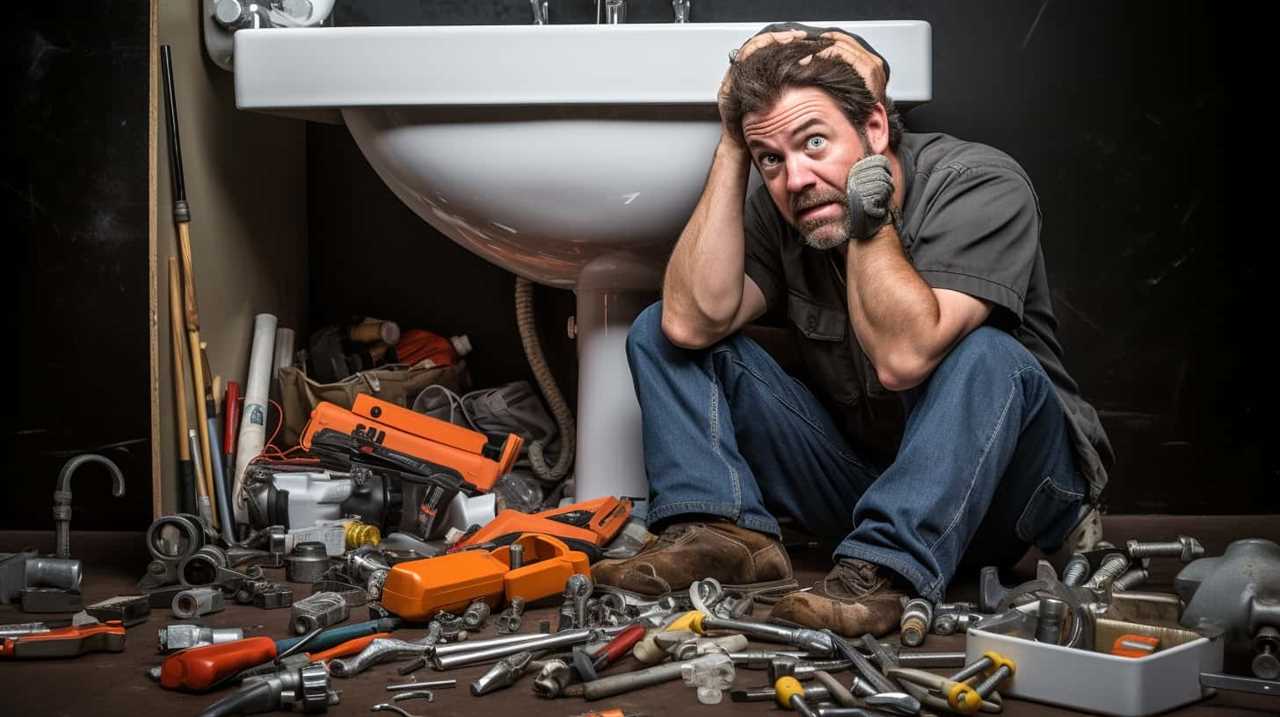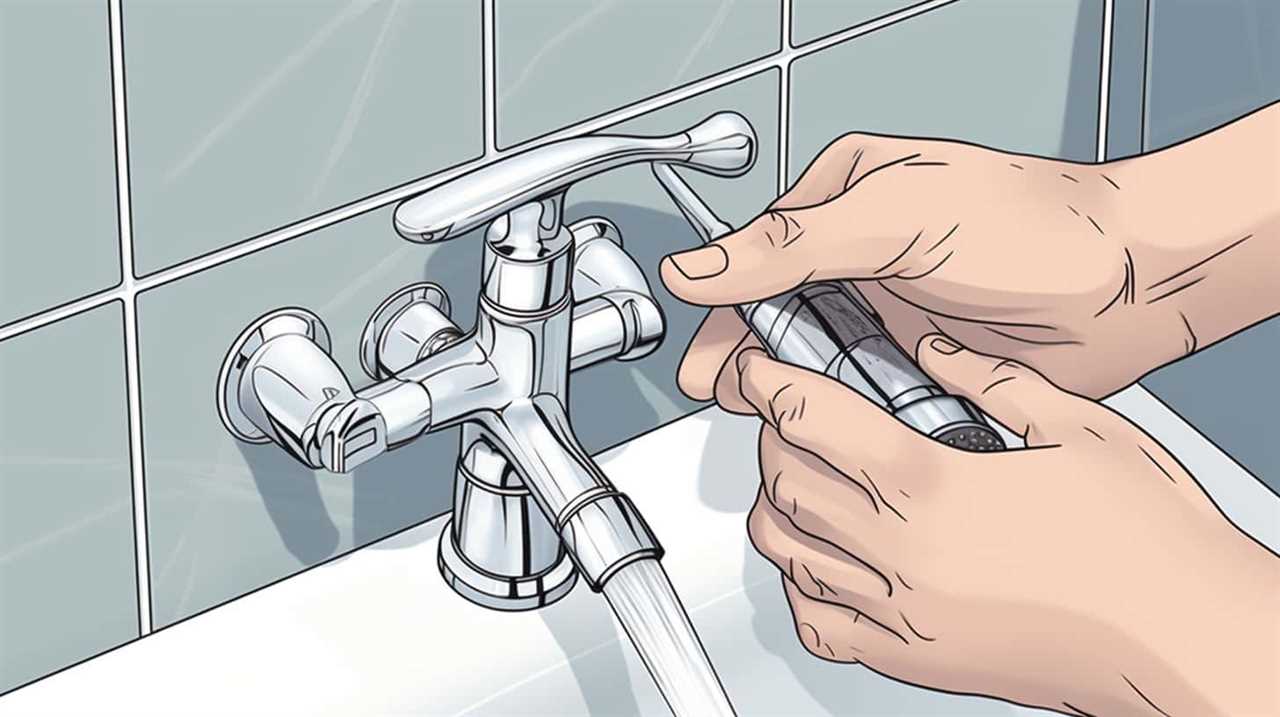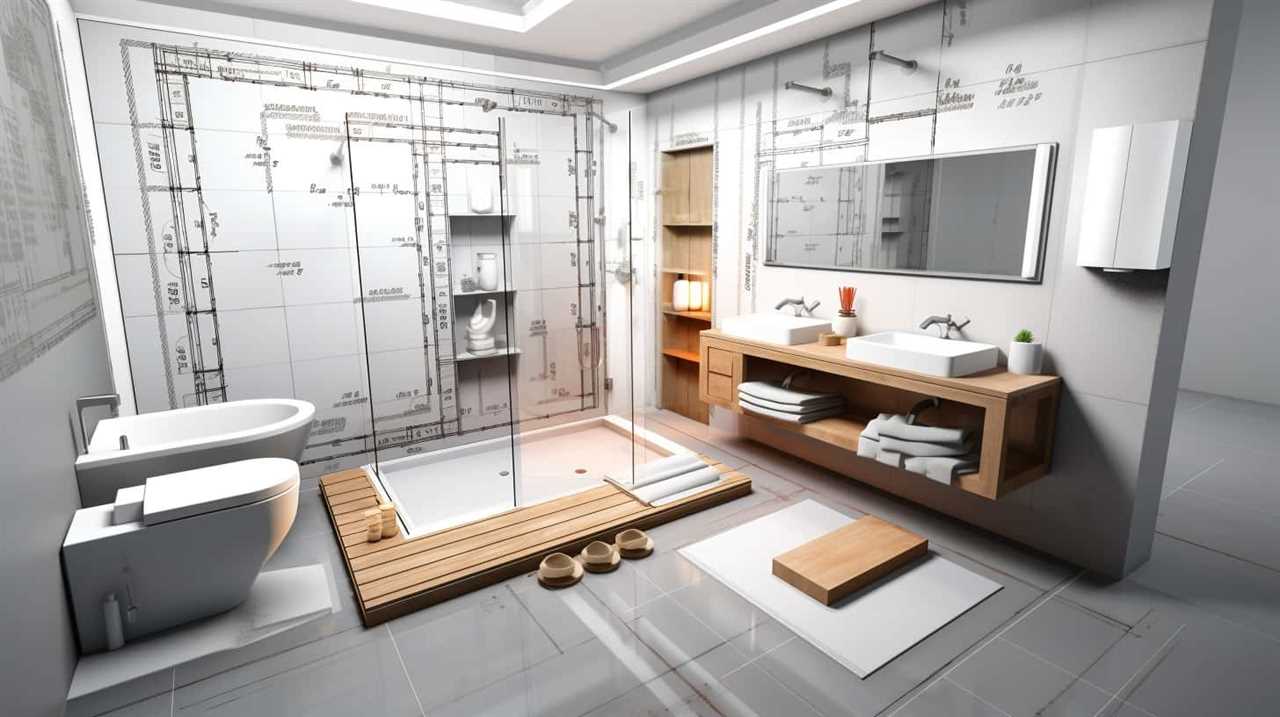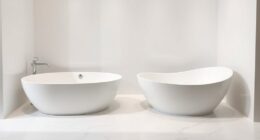We understand that stepping on a bathroom scale can feel intimidating. However, knowing what a bathroom scale is and how it functions is essential for achieving our health and fitness objectives.
So, let’s break it down. A bathroom scale is a device that measures our body weight, helping us track our progress and make informed decisions. It’s a simple tool, but with different types and levels of accuracy, it’s essential to choose the right one for our needs.
Key Takeaways
- A bathroom scale accurately measures and tracks body weight, helping monitor progress and make necessary adjustments to lifestyle and habits.
- Bathroom scales provide accountability and motivation for weight goals, enabling understanding of the impact of dietary choices and exercise routines on weight.
- Some bathroom scales offer additional measurements like body fat percentage and muscle mass using bioelectrical impedance technology, allowing for comprehensive health tracking over time.
- Regular maintenance, including proper calibration and cleaning, is essential for ensuring the accuracy and longevity of a bathroom scale.
Purpose
The purpose of a bathroom scale is to accurately measure and track our body weight. It plays a crucial role in weight management, as it allows us to monitor our progress and make necessary adjustments to our lifestyle and habits.
By regularly using a bathroom scale, we can stay accountable and motivated towards achieving our weight goals. This device helps us understand the impact of our dietary choices and exercise routines on our weight, enabling us to make informed decisions.

Furthermore, the psychological impact of bathroom scale usage shouldn’t be overlooked. It can provide a sense of accomplishment when we see progress, boosting our self-esteem and confidence. On the other hand, it can also serve as a wake-up call if we notice weight gain, prompting us to take action towards healthier habits.
Functionality
To understand how a bathroom scale functions, we need to examine its key components and mechanisms. Modern bathroom scales come with various features and technology advancements that make them more than just a device to measure weight. Here are three important aspects of their functionality:
- Weight Measurement: The primary function of a bathroom scale is to accurately measure your weight. It uses sensors and pressure pads to calculate the force exerted on them when you step on the scale.
- Body Composition Analysis: Many advanced bathroom scales now also provide additional measurements such as body fat percentage, muscle mass, and bone density. They use bioelectrical impedance technology to analyze the electrical resistance in your body.
- Connectivity and Tracking: With the integration of Bluetooth or Wi-Fi, some bathroom scales can connect to your smartphone or fitness apps. This allows you to track and monitor your weight and body composition over time, helping you set and achieve your health goals.
These features and technology advancements make modern bathroom scales an essential tool for those seeking accurate weight measurement and comprehensive health tracking.
Types
Now let’s explore the different types of bathroom scales available on the market.

There are various brands offering a wide range of options to suit different needs.
One popular type is the digital scale, which provides accurate readings and often includes additional features such as body fat percentage calculation.
Another type is the analog scale, which uses a simple mechanical mechanism to measure weight. While analog scales can be less precise than digital ones, they’re often more affordable and don’t require batteries.
Additionally, there are smart scales that can sync with mobile apps, allowing you to track your progress over time.

Each type has its own pros and cons, so it’s important to consider your preferences and requirements before making a purchase.
As we delve into the next section about accuracy, we’ll further explore how these different types of scales measure up in terms of precision.
Accuracy
Moving on to accuracy, let’s examine how different types of bathroom scales measure weight with precision.
Here are three key factors that contribute to the accuracy of a bathroom scale:

- Calibration: A bathroom scale needs to be properly calibrated to ensure accurate readings. Calibration involves adjusting the scale to account for any deviations or inaccuracies. Regular calibration helps maintain the precision of the scale over time.
- Precision Sensors: Modern bathroom scales use high-quality sensors that can detect even the slightest change in weight. These sensors are designed to provide precise measurements, ensuring accuracy when stepping on the scale.
- Weight Capacity: The weight capacity of a bathroom scale plays a crucial role in its accuracy. It’s important to choose a scale that can handle your weight range, as exceeding the maximum weight capacity can affect the scale’s accuracy.
Maintenance
Continuing with maintenance, we need to ensure that our bathroom scale is properly cared for to preserve its accuracy and functionality.
Regular cleaning is essential to keep the scale free from dirt, dust, and debris that can affect its performance. Use a soft, damp cloth to wipe down the surface of the scale, avoiding any harsh cleaning agents that may damage the materials.
Additionally, it’s important to troubleshoot any issues that may arise. If the scale isn’t turning on or displaying inaccurate readings, check the battery to make sure it’s properly inserted and has enough power.
If the problem persists, consult the user manual or contact the manufacturer for further assistance.

Frequently Asked Questions
How Often Should I Calibrate My Bathroom Scale?
We should calibrate our bathroom scale regularly to maintain accuracy. Over time, the accuracy of the scale can change due to factors like wear and tear. It is recommended to replace the scale every few years to ensure accurate readings.
Can a Bathroom Scale Accurately Measure Body Fat Percentage?
Yes, bathroom scales can accurately measure body fat percentage, but they may not be as precise when it comes to muscle mass. It’s important to note that there are no health risks associated with using a bathroom scale.
Is It Safe to Use a Bathroom Scale if I Have a Pacemaker or Other Medical Implant?
It’s important to consider pacemaker safety and any medical implants when using a bathroom scale. Consult with a healthcare professional to ensure it’s safe for you to use a scale with your specific medical condition.
Can a Bathroom Scale Be Used on Carpeted Surfaces?
Yes, a bathroom scale can be used on carpeted surfaces. However, it’s important to note that carpet can affect the accuracy of the scale. For the most accurate results, it’s best to use a bathroom scale on a hard, flat surface.

What Are Some Common Troubleshooting Tips for a Bathroom Scale That Is Not Displaying the Correct Weight?
Some common causes for a bathroom scale not displaying the correct weight are uneven surface, low battery, or calibration issues. To troubleshoot, try placing the scale on a flat surface, replacing the battery, or recalibrating it according to the manufacturer’s instructions.
Conclusion
In conclusion, the bathroom scale is a handy device that allows us to keep track of our weight in a discreet and gentle manner. With its ability to accurately measure our body mass, this essential tool helps us stay informed about our health goals without invading our privacy.
By regularly maintaining our bathroom scale, we can ensure its functionality and reliability, enabling us to achieve our desired weight and maintain a balanced lifestyle.










